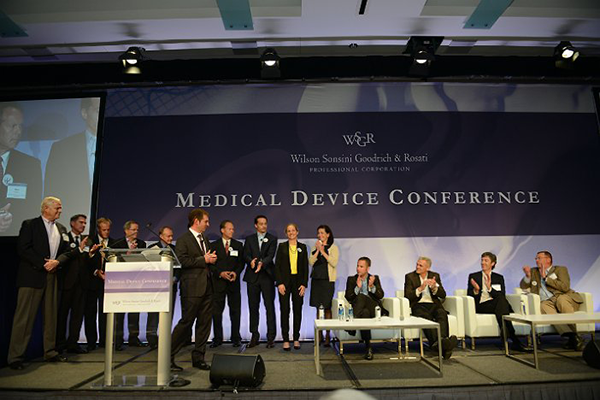 The exciting yearlong MedTech Innovator competition continues with this round’s semifinalists recently announced. Ten early stage medical device companies were selected from 137 submissions. They are currently competing for a live audience favor at the Emerging Medical Technologies Summit in San Francisco. A brief description of each of the teams is below.
The exciting yearlong MedTech Innovator competition continues with this round’s semifinalists recently announced. Ten early stage medical device companies were selected from 137 submissions. They are currently competing for a live audience favor at the Emerging Medical Technologies Summit in San Francisco. A brief description of each of the teams is below.
Bionic Vision Australia: This company has created a sci-fi worthy device that can partially restore vision to people with retinitis pigmentosa and age-related macular degneration. A chip that is surgically implanted in the retina receives input from a camera attached to a pair of glasses worn by the patient. They currently have two versions: a wide view device for mobility and high acuity one for recognizing faces and letters. They are planning on starting clinical trials in 2015.
Briteseed: Accidental blood vessel injury is not uncommon in laparoscopic surgery, which can be much more difficult to control than in an open setting and lead to potentially serious complications. SafeSnips from Briteseed is an integrated device and surgical cutting tool that can detect blood vessels before they are injured and warn the surgeon. While similar technology exists, SafeSnip requires no special contrast agent or auxiliary imaging systems.
Surgisense: During colonoscopy abnormal intestinal tissue can sometimes be missed because they are not readily seen by the human eye. Surgisense has developed an integrated sensor that can detect differences in tissue oxygenation following injection of a phosphorescent probe to identify previously hidden atypical colonic tissue.
2C Tech: This company is looking to slow or halt the process of degenerative eye diseases such as retinitis pigmentosa and diabetic retinopathy with their product, SeeQ. SeeQ is a suspension of nanoparticles that is injected into the eye. The particles then produce electrical stimulation of the retina that stimulates growth factors production which in turn can slow the degenerative process.
Intellidrain: Chest tubes are very commonly used in hospitals worldwide. A typical issue is determining when the lungs have healed and the patient is ready to have their chest tubes removed. Inappropriate removal can lead to further procedures and lengthened hospital stays. A common method is to visually look for a lack of bubbles in the chest tube collection system. Intellidrain looks to take this one step further by actually analyzing the air collected by the chest tube. Using this method they can determine if air collected is actually coming from the lungs and then make a safer and more informed clinical decision.
LifeAssist: Marketed as OnStar for people, LifeAssist is a wrist worn elderly assist device with integrated speech recognition, cellular, WiFi and GPS technology. It also includes a fall detection system, medication reminders, and a guide against wandering.
Nurep: During device heavy surgeries, such as orthopedic or cardiac procedures, it is very common to have multiple device representatives in the room. These reps can actually form a substantial proportion of the costs of utilizing the device in question. Nurep looks to streamline this process through what looks like a combination of representative matchmaking, video conferencing, and tablet technology to rapidly make reps available at lower cost without requiring their physical presence in the operative theater.
Tiny Kicks: Decreasing fetal kicking can be a sign that something is wrong with the fetus. Unfortunately, it is very difficult for patients to subjectively grade the rate of kicks themselves and this can both lead to under and over detection of fetal issues. TinyKicks is developing a flexible sensor that can detect fetal movement and through machine learning algorithms can determine when something is abnormal.
Torix Medical: Torix Medical has created a permanent stent-type device to treat the uncomfortable symptoms of Benign Prostatic Hyperplasia. The device is can be implanted in the office with a cystoscope. It becomes epithelialized once implanted and is meant to remain in the body.
Good luck to all the teams. The winner will be selected by a live audience vote and receive a profile in The MedTech Strategist publication in addition to a presenting slot at the upcoming EMT Summit. The winner will join a group of elite finalists to potentially win a $125,000 prize in the final round.
